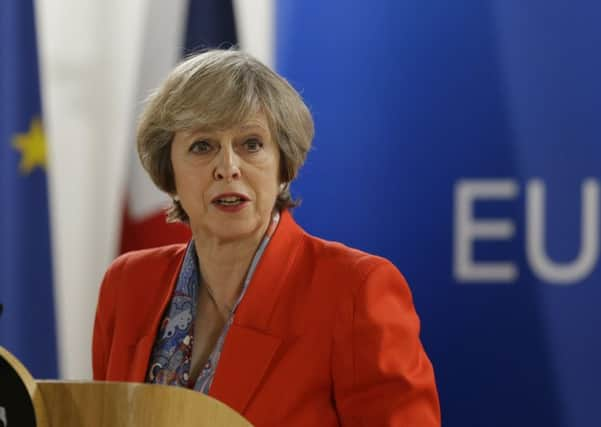MPs demand to see Government's Brexit plan '˜within the next month'


In the highly-anticipated first report from Parliament’s new Brexit select committee, MPs from across all parties will press for a White Paper on the Government’s strategy, detailing its position on access to European markets and the customs union.
They will call on ministers to publish this document by mid-February – alongside any assessments into the risks and opportunities the plan presents – in order to allow for proper scrutiny ahead of triggering Article 50.
Advertisement
Hide AdAdvertisement
Hide AdAnd they will urge ministers to offer further commitments on a transitional trade deal, should their attempts to secure a new permanent trade arrangement within the two-year negotiating time frame prove unsuccessful.
The report, compiled by MPs from both sides of the referendum campaign, comes ahead of a speech by the Prime Minister on Tuesday in which she is expected to spell out further details of her Brexit strategy.
It has been suggested that Mrs May will use the address to commit to leaving the Single Market if she cannot get concessions on free movement – but these claims have been dismissed as speculation.
It also comes ahead of the Supreme Court ruling on whether Parliament will be given a vote on triggering Article 50, which is expected to be announced later this month.
Advertisement
Hide AdAdvertisement
Hide AdThe select committee stresses that it did not set out to comment on this case, but it does issue a separate call for MPs to be given a vote on the final deal once negotiations with the European Union have concluded.
The main concern expressed by the report is the need to ensure “transparency” and “clarity” throughout the Brexit process, beginning with the publication of the Government’s plans.
Ministers have repeatedly asserted that they will not provide a “running commentary” on negotiations with the EU, claiming they want to avoid “revealing their hand” to the other side.
However the committee contends that without some fundamental details, Parliament will be unable to scrutinise the Government’s position before the start of formal negotiations.
Advertisement
Hide AdAdvertisement
Hide AdIt therefore calls for details to be released in a White paper, stressing that the Government’s position on membership of the Single Market and the Customs Union must be included.
“We’re not asking the Government to give away its red lines or negotiating fall back positions, but we do want clarity on its broad aims given the significance and complexity of the negotiating task,” said committee chairman Hilary Benn.
“This White Paper must be published by mid-February to give Parliament and the devolved governments time to scrutinise it.”
It’s other recommendations include a commitment from ministers that they will pursue a transitional trade agreement with the EU, should they fail to secure a new deal within the two-year Article 50 time frame.
Advertisement
Hide AdAdvertisement
Hide AdBoth the Prime Minister and Brexit Secretary David Davis have indicated that they want to negotiate a new trading relationship in parallel with exit talks, but the committee warns that this may not be possible.
It claims that any resulting change in regulation or customs arrangements would be “extremely disruptive” to industries in both Britain and Europe, and the threat of this “cliff-edge” could push some companies to pre-emptively relocate.
“It would be in the interests of both sides of the negotiations for an outline framework, with appropriate transitional arrangements for the UK’s future relationship with the EU, to be agreed,” it states.
The report also raises concerns about the expertise and resources available to the civil service to deal with the added “strain” of delivering Brexit.
Advertisement
Hide AdAdvertisement
Hide AdIt suggests there will be a need to expand staff numbers, and to identify “where the gaps in the knowledge and experience of the civil service lie”.
And it repeats calls for devolved nations and English regions to have their views taken into account during negotiations, with a particular emphasis on Northern Ireland.
“It is essential that closer UK–Irish relations and stability in Northern Ireland... are not jeopardised by the UK’s exit from the EU,” it states. “The
Executive and the Assembly...should be involved at every stage.”